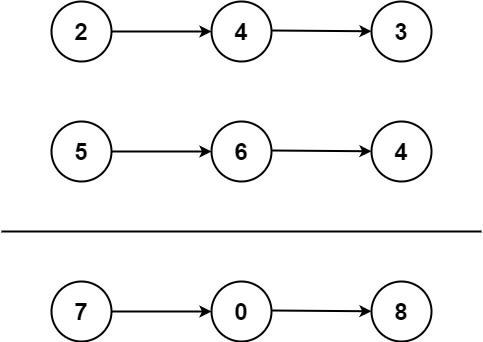You are given two non-empty linked lists representing two non-negative integers. The digits are stored in reverse order, and each of their nodes contains a single digit. Add the two numbers and return the sum as a linked list.
You may assume the two numbers do not contain any leading zero, except the number 0 itself.
Example 1:
Input: l1 = [2,4,3], l2 = [5,6,4]
Output: [7,0,8]
Explanation: 342 + 465 = 807.
Example 2:
Input: l1 = [0], l2 = [0]
Output: [0]
Example 3:
Input: l1 = [9,9,9,9,9,9,9], l2 = [9,9,9,9]
Output: [8,9,9,9,0,0,0,1]
Constraints:
- The number of nodes in each linked list is in the range
[1, 100]. -
0 <= Node.val <= 9 - It is guaranteed that the list represents a number that does not have leading zeros.
SOLUTION:
# Definition for singly-linked list.
# class ListNode:
# def __init__(self, val=0, next=None):
# self.val = val
# self.next = next
class Solution:
def addTwoNumbers(self, l1: Optional[ListNode], l2: Optional[ListNode], carry=0) -> Optional[ListNode]:
if l1 or l2:
l1val = l1.val if l1 else 0
l2val = l2.val if l2 else 0
currval = l1val + l2val + carry
curr = ListNode(val = currval % 10)
curr.next = self.addTwoNumbers(l1.next if l1 else None, l2.next if l2 else None, carry = currval // 10)
return curr
else:
if carry > 0:
return ListNode(val = carry)
return None



Top comments (0)